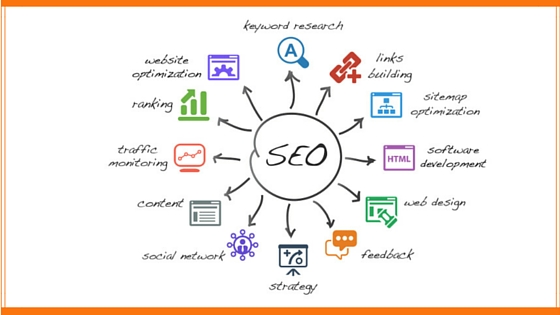If you are a local business, then getting found online through the popular search engines is the game.
To get found, you must either put a pay per click campaign into your budget or put some blood sweat and tears into getting found “organically” via Search Engine Optimization, or “SEO.”
Curious about how much WeWork spends on PPC, organic key word rankings, organic ranking history and more?
Click here to download one industry leader’s SEO report.
Here’s an overview of SEO and some tips on getting the basics right.
What is SEO?

According to Wikipedia, “Search engine optimization (SEO) is the process of affecting the visibility of a website or a web page in a search engine‘s unpaid results—often referred to as “natural,” “organic,” or “earned” results. In general, the earlier (or higher ranked on the search results page), and more frequently a site appears in the search results list, the more visitors it will receive from the search engine’s users. SEO may target different kinds of search, including image search, local search, video search, academic search,[1] news search and industry-specific vertical search engines.”
Your SEO Goal Is First Page Ranking
Your #1 marketing goal as a local business, is to show up as high as possible on the first page of Google search results for the relevant keywords in your market. To do this, you must take relevant, consistent action to build credibility with Google. Two ways to find out what you should be doing: 1) Get a referral for an industry expert with demonstrated results increasing page rank; 2) Try my favorite DIY, virtually dummy-proof resource, Upcity, or do a combination of both. Upcity gamifies the SEO process by giving you points for each SEO-related task that you (or your team) complete. It gives you very clear, specific instructions for each category of SEO activity from submitting to the right directories (who knew) to writing blog posts with key words.
Is your Website Responsive? Google Will Penalize your Non-Mobile Friendly Site.

It’s been almost a year now that mobile search has overtaken desktop searches. Google gives priority to responsive, mobile-friendly site. If you have not updated your site, now is the time to call your friendly web developer. Right now.
What is one Industry Leader Spending on Pay Per Click?
Under certain circumstances, you may want to invest in paid search or “pay per click.” Curious about how much WeWork spends on PPC, organic key word rankings, organic ranking history and more?
Click here to download one industry leader’s SEO report.
Shoppers Want Evidence that your Space Should be on Their Short List
Amazon.com turned us all into review-crazed shoppers. If it’s not heavily reviewed, we don’t buy it. The same applies to shopping for workspace. Every month, there are 139 million unique visitors to Yelp and restaurants are not the largest search category. Acquiring Yelp reviews can be challenging. Yelp likes reviews from active Yelp users and won’t show those that look suspicious or sudden bursts of reviews that come in around the same time, preventing you from running a short-term review campaign. Soliciting social reviews should be a part of your overall marketing strategy with tactics spread across your member interactions. Google Reviews are much easier to generate – Google doesn’t require a login and they don’t seem to be trolling for suspicious activity. Pro tip (which once got us 56 reviews in 3 weeks across two locations): Ask members to trade you a Google review for a piece of pizza or a glass of wine at happy hour. And if someone has a great experience in a meeting room, send them a follow-up email with a link to your Google reviews and remind them how important reviews are for local businesses. Consumers will be suspect of businesses with no Yelp or Google reviews. You must nurture these sites as part of your overall marketing plan.
Blogs Keep you Relevant
Does the last post on your blog have a 4 in the date? As in 2014? Google likes dynamic, relevant content and your potential members are skeptical when they see no activity on blogs or social channels. If you aren’t going to be active on social media, just don’t do it at all. If you can write one post a month and post it to your blog, that’ll be 12 posts a year that will build your SEO. I know you hate writing. Here’s how to cheat while keeping the content really relevant. Create a member interview template with keywords in it (coworking, shared office space, virtual mail). Email it to them, tell them you’d like to feature them and their business on your blog. You might have to follow up a couple of times to get it, but everyone likes to talk about themselves and promote their business. Make each member interview a separate post. Promote the posts on social media. Win, win, win.
What tips do you have to share with the community on getting reviews and staying on Google’s good side?



